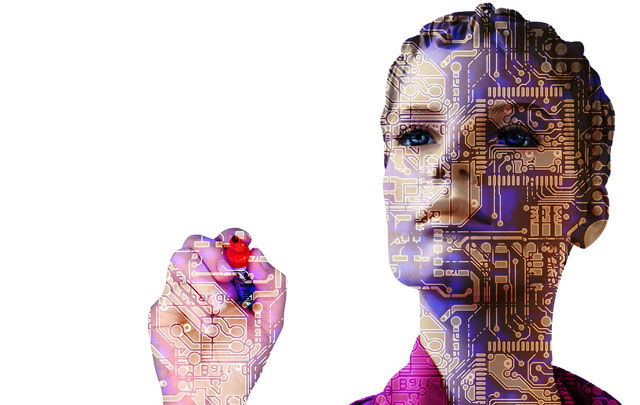 Intelligent robots are poised to take over the world. Sounds like a bad 1950s sci-fi movie, right? Perhaps not. If technology keeps accelerating at the current rate, robots and artificial intelligence will either displace or replace tens of millions of jobs by 2037.
Intelligent robots are poised to take over the world. Sounds like a bad 1950s sci-fi movie, right? Perhaps not. If technology keeps accelerating at the current rate, robots and artificial intelligence will either displace or replace tens of millions of jobs by 2037.
If this sounds far-fetched, consider the fact that both Bill Gates (co-founder of Microsoft) and Elon Musk (founder of Tesla and SpaceX) have both suggested economic policies to mitigate the coming disruption to the world’s labour markets.
Gates suggests taxing robot workers in the same way as we do humans. “You can’t just give up that income tax, because that’s part of how you’ve been funding … human workers,” he told Quartz.
Musk goes a step further, calling for a universal basic income to counterbalance the replacement of human workers. “I’m not sure what else one would do,” he said in an interview with CNBC.
When technology billionaires start suggesting policies straight out of a socialist manifesto, you know that the change is both imminent and tangible. And this isn’t just theory — several large companies are already employing robots at scale.
For example, Amazon employs over 45 000 robots in 20 of its vast fulfilment centres. This is 50% more than just a year ago. Amazon’s management team tends to play these numbers down, at least in public, viewing the programme as a work in progress. But there’s no doubt that these 45 000 robots have replaced at least some human workers.
Both Amazon and UPS (a major US courier) are trialling automated package delivery drones. Musk’s newest venture — an enormous battery factory in the Nevada desert — will be nearly 100% automated soon. The first phase of this “Gigafactory” opened in July 2016.
If you broaden the definition of robot very slightly, then you can include the self-driving cars that Waymo (owned by Google) and Uber are trialling in major American cities, as well the self-driving trucks being developed by Otto.
And this isn’t reserved for sexy, hi-tech industries. A Japanese lettuce farm is run entirely by robots. A small hotel chain is using robots to carry guests’ bags and deliver their laundry. Several US retailers are experimenting with robots to check stock levels and lead customers to the items they’re looking for.
This is possible because of three converging waves of technology: artificial intelligence (in the form of neural networks or “deep learning”), ubiquitous connectivity (the Internet of things) and smart sensors.
Self-driving cars are a great example of how these technologies interact with and reinforce each other. These cars use Lidar — a laser-based guidance system — as well as arrays of cameras and other sensors to scan the world around them for other cars, pedestrians, obstacles and traffic signals.

As they drive along, they send and receive a stream of data which is crunched, in real time, by powerful computers (called servers) sitting in data centres. The servers send information to the cars — such as how much traffic there is along the route — but also collect everything that a car “sees”.
The servers then collate data from all the cars and use it to literally learn how humans drive, the best routes to take and how best to avoid accidents. As such, the engineers who build these cars don’t have to program for every single possibility that a car might encounter, they just need to teach it the basic rules and then it (and its fellows) will learn as they go.
Therefore, it’s possible to say, already, that self-driving cars are better at navigating roads than humans. We tend to be distracted and emotional. We consider ourselves rational, but simple experiments prove both that we are unable to recognise our own irrationality and that we are irrational much of the time. We aren’t great drivers, and we can’t even recognise that fact.
So, if robots are already able to operating heavy machinery on public roads safely, navigating all the vagaries of city traffic, how big a leap is it to robots that can replace your own job?
The effects won’t be limited to service and manufacturing jobs. Many professional and administrative functions are ripe for disruption by artificial intelligence. We can already see the beginnings of this in fields like investing and tax preparation.
Essentially any job that can be broken down into discrete and well understood procedures (or rules) can be done more quickly and accurately by artificially intelligent machines. And because these machines continuously learn and improve, they will only get better over time.
This will not be a sudden transition. Long before robots are completely self-governing, they will allow people in lower income countries to work remotely in higher income countries. Why import hotel maids from South America or the Philippines when they can drive housekeeping drones from tele-robotics centres in their home countries?
This trend, which economist Richard Baldwin calls tele-robotics, will set off the first wave of disruption, displacing millions of previously safe jobs in service industries. And Baldwin believes there’s not much we can do about it: “I don’t think you can stop it. There are very likely to be some nasty policies against it, but on the edge, it’s going to happen.”
This is what the anti-globalisation and anti-immigration movements completely fail to grasp. The daily buffoonery of the Donald Trump administration distracts from a much more serious issue: the very premise of its economic policy platform is not based in reality. The jobs are not coming back and in many cases will soon cease to exist.
This is the new Industrial Revolution. As with its forebear, it will make future generations richer, healthier and happier. But in the medium term it looks set to cause enormous disruption to global labour markets. We need strategies and policies to deal with those disruptions, or hundreds of millions of people could be plunged into abject suffering (which some only escaped a generation ago).
And if two decades seems like an unrealistic timeline, consider how much technology has changed the world since 1997. Billions of people are now online every day (in many cases, every hour), most of them using smartphones. We now can not only read but also write (and rewrite) genetic code in living organisms. And the pace of innovation is still accelerating.

The long-term implications of this revolution are impossible to predict with any accuracy. The most utopian vision is a world of post-scarcity, where the whole reason for economics (the distribution of scarce resources) disappears. When goods and services are unlimited and require no effort, then poverty ceases to exist. This is the world as people like Musk see it.
The dystopian view is that robotics will concentrate wealth even further into a ruling tech elite who control most of the world’s resources, with the rest of us relegated to living off the scraps.
The most likely outcome is somewhere between these two poles. There will be a period of acute, concentrated economic hardship for many workers, but over time the entire population of the world will be lifted to another level of development.
The challenge is to keep our societies from breaking down in the interim. We need to start planning for this now, or it will soon be too late. — (c) 2017 NewsCentral Media
- Alistair Fairweather is the founder of PlainSpeak, a consultancy focused on helping businesses and people to get the most out of technology

